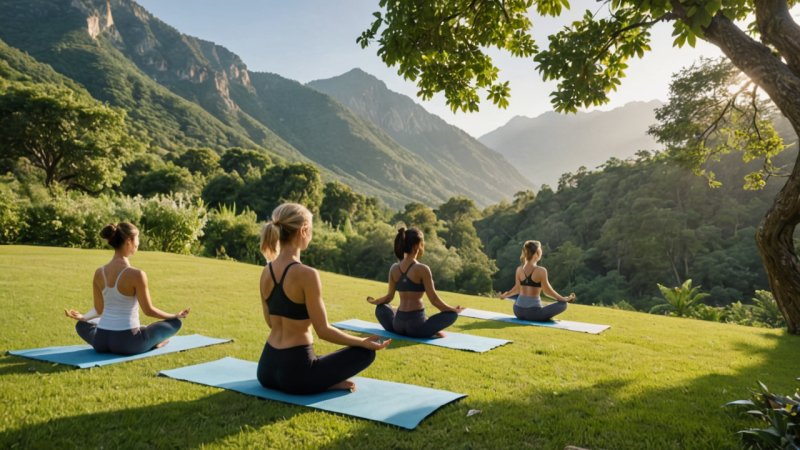In a world increasingly dominated by technology and urban living, the call of nature has never been more potent. To better understand the allure of nature-based wellness retreats, we turn to our fictional expert, Dr. Elara Greenfield, a renowned wellness consultant and nature therapy advocate. With a Ph.D. in Environmental Psychology and over 15 years of experience in holistic wellness, Dr. Greenfield offers invaluable insights into how immersing oneself in natural surroundings can promote mental and physical well-being. Through this engaging interview, we explore some of the best destinations for nature-based retreats around the globe.
What is the significance of nature in wellness retreats?
Dr. Greenfield: Nature has an incredible ability to heal and rejuvenate the human spirit. Studies have shown that spending time outdoors can reduce stress, boost mood, and improve cognitive function. In wellness retreats, nature acts as a backdrop for various therapeutic practices, from yoga and meditation to hiking and foraging. The integration of nature into these experiences provides a holistic approach to well-being, allowing individuals to connect with the environment and themselves.
Can you share some top destinations for nature-based wellness retreats?
Dr. Greenfield: Absolutely! Here are a few standout locations:
- Bali, Indonesia: Known for its lush landscapes and serene beaches, Bali offers a plethora of wellness retreats that incorporate local traditions, such as Balinese massages and yoga classes overlooking rice terraces.
- Sedona, Arizona, USA: With its stunning red rock formations and vortex energy sites, Sedona is perfect for those seeking spiritual healing and natural beauty. Many retreats here focus on mindfulness and connecting with the land.
- Reykjavik, Iceland: The unique geothermal landscapes and breathtaking natural hot springs make Iceland an ideal location for wellness retreats. Many programs include activities like outdoor baths and guided hikes.
- Chiang Mai, Thailand: Surrounded by mountains and lush forests, Chiang Mai offers retreats that emphasize traditional Thai wellness practices, including herbal medicine and mindfulness techniques.
- Tuscany, Italy: The rolling hills and vineyards of Tuscany provide a picturesque setting for retreats focused on relaxation and culinary wellness, often incorporating farm-to-table dining experiences.
What activities or practices should individuals expect at these retreats?
Dr. Greenfield: Each retreat offers a unique blend of activities, but common practices include:
- Yoga and Meditation: Most retreats incorporate daily yoga sessions and guided meditations, allowing participants to center themselves and connect with nature.
- Nature Walks: Guided hikes or nature walks are often included, enabling participants to explore the local environment and appreciate its beauty.
- Workshops: Many retreats offer workshops on topics like nutrition, mindfulness, and sustainable living, empowering individuals to carry these practices into their daily lives.
- Holistic Therapies: From massages to sound healing, many centers provide various holistic treatments to promote relaxation and healing.
How can someone choose the right retreat for their needs?
Dr. Greenfield: Choosing the right retreat is a personal journey. Here are some tips:
- Define Your Goals: Are you looking to relax, heal, or learn new skills? Understanding your objectives will help narrow down your options.
- Research Retreats: Look into different retreats and read reviews from previous participants to gauge the experience.
- Check the Location: Consider what natural surroundings resonate with you—mountains, beaches, or forests? The environment can significantly impact your experience.
- Assess the Program: Review the itinerary and ensure that it aligns with your interests and wellness goals.
What benefits can someone expect after attending a nature-based wellness retreat?
Dr. Greenfield: Participants often report several benefits, including:
- Improved Mental Health: Many attendees experience reduced anxiety and depression, leading to a more positive outlook on life.
- Enhanced Creativity: Being in nature can spark creativity and inspire new ideas, which is especially beneficial for those in creative fields.
- Stronger Connections: Retreats often foster community among participants, creating lasting friendships and support networks.
- Greater Mindfulness: Many leave with a heightened sense of awareness and mindfulness, which they can integrate into their daily lives.
In your opinion, what is the future of nature-based wellness retreats?
Dr. Greenfield: I believe the future is bright. As more individuals seek balance and well-being, the demand for nature-based experiences will only grow. These retreats will continue to evolve, incorporating sustainable practices and deeper connections with the land. We will likely see more integration of technology, such as virtual retreats that allow people to experience nature from home, while still emphasizing the essential benefits of direct connection with the natural world.
In conclusion, nature-based wellness retreats offer transformative experiences that rejuvenate the mind, body, and spirit. By immersing oneself in beautiful natural surroundings, participants can find peace, healing, and inspiration. As Dr. Greenfield suggests, selecting the right retreat that aligns with personal goals and preferences is essential for maximizing these benefits. With nature's healing powers at our fingertips, the journey to wellness is more accessible than ever.






